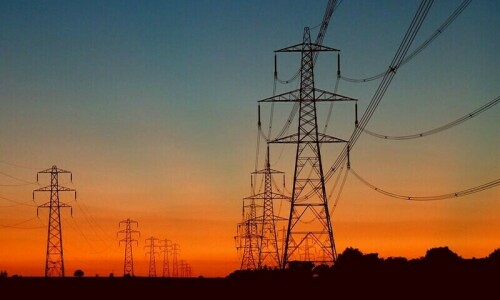LONDON: Europe’s oil majors will strike a sober note in their fourth-quarter results and investors will focus on companies’ plans to maintain cherished dividends and their strategies to cope with the oil prices collapse that caught many unawares.
Having sold around $120 billion in assets in recent years to boost balance sheets and keep up dividend payouts, companies are expected to increase borrowing and further cut costs as they come to terms with oil prices that have more than halved since June to around $50 a barrel.
“Lower oil prices pose the biggest threat to oil and gas industry earnings and financial solidity since the financial crash of 2008,” consultancy Wood Mackenzie said in a note.
“More evidence of how this is affecting performance and strategy will appear in the Q4 results and further pared-back 2015 investment plans.”
For the last quarter of 2014, earnings per share (EPS) for European integrated oil companies, including Royal Dutch Shell , BP, France’s Total, Italy’s Eni and Spain’s Repsol, are expected to fall on average by around 24 per cent, according to Barclays analysts.
As investors come to terms with a roughly 20pc drop in oil companies’ shares since last June, according to Reuters data, the focus will turn to how boards plan to adjust to the new environment.
So far there is no hint of any major oil companies scaling back their dividend payouts, which for decades have been the key attraction for investors. Shell, for example, has not cut its dividend since 1945.
“We will be able to preserve the dividend. It is absolutely our rock solid intention,” BP Chief Executive Bob Dudley told Reuters on the sidelines of the World Economic Forum in Davos, Switzerland.
“Your cash flow spending options are dividends, buy backs, capex and cost - these are really the four things you can work with,” Dudley added.
Total CEO Patrick Pouyanne also said it would maintain dividends while Eni chief Claudio descalzi told Reuters television he was confident prices would rebound and that the company would be also able to sustain dividends.
Nomura and Barclays analysts expect an average 7pc year-on-year decline in spending in 2015 for European oil majors. But with a large part of this year’s project spending already committed, borrowing is inevitable.
“Ultimately, Big Oil remains on the back foot and the transition to more sustainably covering capex and the dividend is pushed out further to 2017 on our base-case estimates,” Nomura analysts said in a note.
Analysts at Jefferies say that with an estimated average net debt to capitalization ratio of 14pc at the end of 2014, oil majors are in a good position to increase borrowing, which the bank expects will reach 21pc by the end of 2016.
Published in Dawn, January 25th, 2015
On a mobile phone? Get the Dawn Mobile App: Apple Store | Google Play
















































Dear visitor, the comments section is undergoing an overhaul and will return soon.